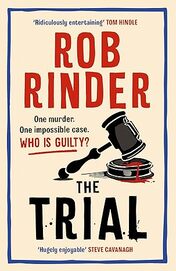|
Disclaimer: The views expressed in this book review are those of the review's author and are not necessarily those of Selfishgenie Publishing.  “The Trial” is Rob Rinder’s first foray into fiction and it’s one that will keep you guessing all the way to the big reveal. For those outside the UK who are unfamiliar with Rob Rinder, he is our equivalent to “Judge Judy”. As a successful barrister (trial lawyer for our overseas readers) he was well known in legal circles before venturing onto our TV screens. Now he appears in a variety of shows in different formats, including documentaries. With this foray into fiction, he becomes not only Britain’s Judge Judy, but also Britain’s John Grisham. The story is basically a courtroom drama, but one with a strong human element. Unusually, it doesn’t follow the exploits of an experienced lawyer plying his trade against all odds, but instead the protagonist is a novice, stumbling through the foothills of the legal mountain range as he learns his trade while flirting with the ruination of his career before it even gets started. Adam Green is a law graduate from Oxford University who is the second 6 month of his yearlong pupillage – the basic training for a barrister where he is supposed to be mentored by a King’s Counsel in a prestigious “chambers”, as legal businesses are called in the UK. If Adam performs well he will be offered a “tenancy”, which is basically a full time job in the firm. But there is only one position available at the end of the year and he has a rival with whom he must compete, the attractive and outgoing Georgina. Adam is very much an introvert to Georgina’s extrovert, and she isn’t afraid to use her gender to charm her male colleagues. Adam, while being a very likeable person, usually comes across as socially inept, which is very much a disadvantage in the British legal profession. I frequently found myself wondering how much of Rob Rinder there was in the character of Adam. For the uninitiated (like me) there is a lot of arcane terminology to get your head around that has nothing to do with the law itself, but everything to do with the ancient traditions of the legal profession as practised in the UK. Several hundred years of custom and practice have created a world that is closed to the outsider, but for which Rob Rinder raises a corner of a curtain to allow us to peek inside. "a national hero who once saved the life of the Queen." For example, did you know that barristers never shake hands with other barristers? No, nor did I. It has something to do with barristers trusting each other and not needing to shake hands in order to prove their hands are empty of weapons. Who knew? Stag Chambers, the place where Adam is a pupil, is asked to defend a man accused of murdering a police officer. Not just any police officer, however, a national hero who once saved the life of the Queen. "a deeply unlikeable person who has little time for young whippersnappers like Adam" It is an open and shut case, to all intents and purposes and Jonathon Taylor-Cameron, Adam’s pupil-master (mentor) considered it beneath him to attempt to mount a defence. But legal traditions dictate that he can’t turn the case down and Adam is assigned as his “junior”, or assistant. Which means Adam does the hard work of preparing the case while Jonathon does the grandstanding on the courtroom floor. Needless to say, Taylor-Cameron is painted as a deeply unlikeable person who has little time for young whippersnappers like Adam, creating a major source of conflict within the plot. "A reasonable doubt is all that is required to obtain an acquittal." Adam soon starts to believe that their client, Jimmy Knight, is innocent but the evidence is stacked against him. The big question throughout the book is whether Adam can find the evidence that will get their client acquitted, or at least cast doubt on the evidence provided by the prosecution, so that a reasonable doubt is created in the minds of the jury. A reasonable doubt is all that is required to obtain an acquittal. Obviously, I can’t say much more than that, because it would spoil the book. But I can say that there are so many secrets to be exposed that Adam has his work cut out to make sense of it all. And just to add a bit of extra drama, if he doesn’t make a good job of the defence, it is unlikely that he will be offered the permanent position at Stag Chambers.  Author Robert Rinder Author Robert Rinder Rinder’s writing style is easy to read, and he makes some complex subjects easy to understand. His knowledge of the British legal system is obvious, and he does his best to make sure that readers can understand it as well. I found myself turning the pages in anticipation of the next twist the plot might take and what new secrets would be exposed. There are red herrings aplenty, but the truth is there to be discovered if you can pick up on the subtle clues that Rinder drops into the narrative. But there are also a few lessons to be learned about the morality of the legal system and it becomes quite clear that justice is often not what is done, but what is seen to be done. You would think the legal system is there to establish guilt or innocence, but those concepts seem to slip between the cracks when it comes to what can be proved and what can’t. If you like legal dramas, then I highly recommend you give this one a go. “The Trial” by Rob Rinder is an absorbing read which left me wanting to read Rinder’s next book (assuming there is one) straight away. If you have enjoyed this blog, or found it informative, then make sure you don’t miss future editions. Just click on the button below to sign up for our newsletter. We’ll even send you a free ebook for doing so.
0 Comments
Leave a Reply. |
AuthorThis blog is compiled and curated by the Selfishgenie publishing team. Archives
June 2025
|

 RSS Feed
RSS Feed